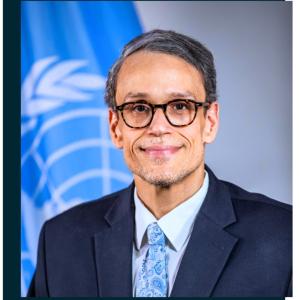The Attorney General and Minister of Justice,
The Deputy Head of Office of the Peacebuilding Support Office,
Development Partners,
UN Heads of agencies and colleagues,
Civil Society Organizations,
The Media,
Good Morning to you all,
It is a profound honor to address this esteemed gathering, united by a shared commitment to advancing peace, justice, and reconciliation in The Gambia and beyond. The transformation we have witnessed in The Gambia since 2017 stands as a testament to what a nation can achieve when its people unite behind the principles of democracy and justice – with over 1,000 victim testimonies heard and more than 200 perpetrators coming forward in pursuit of truth and reconciliation.
Let me begin by extending heartfelt thanks to the Government of the Republic of The Gambia for its leadership in hosting this consultation and for its unwavering partnership with the United Nations. Your dedication to fostering peace and reconciliation serves as an inspiring testament to the resilience and strength of the Gambian people.
I also wish to recognize the contributions of civil society, national institutions, and community leaders who have been tireless advocates for human rights, justice, and reconciliation. Your voices have shaped the transition we gather to reflect on today. Additionally, I extend my gratitude to our colleagues from the Peacebuilding Support Office (PBSO), as well as the Department of Political and Peacebuilding Affairs (DPPA), whose vision and efforts have brought us together under the Peacebuilding Impact Hub initiative.
Since the peaceful transfer of power in January 2017, The Gambia has embarked on an extraordinary journey of democratic transition. It is a story of hope and determination in the face of immense challenges, marked by significant achievements, particularly in transitional justice, where The Gambia has emerged as a model of resilience and progress within the West African region.
The establishment of the Truth, Reconciliation and Reparations Commission (TRRC) marked a pivotal milestone in this journey. Through its work, the TRRC has documented 1,253 witness testimonies, representing victims from every region of The Gambia. The Commission has not only acknowledged the suffering endured by victims but has also administered interim reparations to 617 victims to date, setting a concrete foundation for justice and healing. The Government's commitment of 150 million dalasis ($2.6 million) to the victim's compensation fund further demonstrates the seriousness of these efforts.
Equally noteworthy is the establishment of The Gambia's first National Human Rights Commission, which continues to investigate cases of human rights violations in the country. This institution embodies the principles of fairness and accountability, crucial for building the social contract between the state and its citizens.
In parallel, progress has been made in Security Sector Reform (SSR), with a clear vision of transforming the security institutions into pillars of democracy and human rights. Together, these initiatives reflect the essence of peacebuilding—a multifaceted, inclusive process rooted in justice, trust, and mutual accountability.
Distinguished Participants,
Seven years into The Gambia's transitional justice process, today's consultation serves as a critical juncture. It is a moment for reflection, learning, and recommitment.
The objectives of this National Consultation are threefold:
1. This kick-start the process of documenting the progress made, while openly reflecting on the challenges faced in implementing transitional justice and reconciliation efforts which have laid a strong foundation for peacebuilding. Through this exercise, we will have an opportunity to distill those lessons into actionable insights.
2. As part of the broader Peacebuilding Architecture Review, this consultation will contribute to global discussions on enhancing the effectiveness of peacebuilding initiatives. The insights gathered will enrich the global body of knowledge, enabling Member States and partners to refine their approaches to peacebuilding.
3. Today marks the beginning of a year-long deep dive to document the results and outcomes of The Gambia’s peacebuilding efforts. Through a robust partnership with the PBSO, this exercise will provide evidence and illuminate the roles played by various actors, including the Peacebuilding Commission (PBC) and Peacebuilding Fund (PBF), and offer recommendations for future efforts.
Distinguished Ladies and Gentlemen,
We are reminded today that transitional justice is not merely a process; it is a promise—a promise to victims, survivors, and future generations. It is a promise to confront the past honestly, to ensure accountability, and to build a society rooted in dignity and equality.
None of the progress we celebrate today would have been possible without strong partnerships. The Government's collaboration with the United Nations, international financial institutions, and regional organizations has been instrumental. Civil society and community actors have also played indispensable roles, ensuring that the voices of the marginalized and vulnerable are heard.
As we launch the Country Spotlight Exercise, I urge all stakeholders to actively participate in the process. We will establish a dedicated online portal for continuous stakeholder feedback and quarterly progress updates, ensuring transparency and accountability throughout the assessment period.
Finally, let us recommit to the principles that have guided The Gambia's peacebuilding journey thus far: justice, inclusion, and resilience. Together, we can build a future where peace is not merely the absence of conflict, but a vibrant reality for all.
Thank you all for your kind attention




